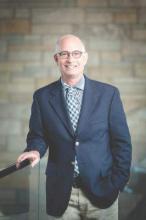Gerard Silvestri, MD, MS, FCCP, will be inaugurated as the new President of CHEST next month in Los Angeles during CHEST 2016. He is the Hillenbrand Professor of Thoracic Oncology and Vice Chair of Medicine for Faculty Development at the Medical University of South Carolina, Charleston. Dr. Silvestri completed his fellowship training in pulmonary and critical care at Dartmouth, Hanover, N.H. He has an advanced degree in the evaluative clinical sciences, also from Dartmouth. He is a lung cancer and interventional pulmonologist with an interest in health services research, lung cancer screening, nodule evaluation and management, and staging of lung cancer.
After becoming a Fellow of the American College of Chest Physicians in 1998, Dr. Silvestri became active with the NetWorks, serving on the Steering Committees of the Thoracic Oncology and the Interventional Chest/Diagnostic Procedures NetWorks, eventually chairing the Thoracic Oncology NetWork. Dr. Silvestri has also served on the Nominating Committee, the CHEST Scientific Program Committee, the CHEST Foundation Development Committee, as Treasurer and Trustee on the foundation’s Board of Trustees, and as a Regent-at-Large for the American College of Chest Physicians for 3 years. At CHEST 2012, Dr. Silvestri was awarded the Pasquale Ciaglia Memorial Lecture in Interventional Medicine, and at CHEST 2014, he received the Edward C. Rosenow III, MD, Master FCCP/Master Teacher Honor Lecture award. Dr. Silvestri has authored more than 200 scientific articles, book chapters, and editorials, and he currently serves on the editorial board of the journal CHEST.
We asked Dr. Silvestri for some thoughts on his upcoming CHEST presidency.
1. What would you like to accomplish as President of CHEST?
As boring as this may sound, the role of the President is to oversee and carry out the strategic plan set forth by a very capable Board of Regents. It is an ambitious undertaking and among other things, it includes increasing the output of clinical practice guidelines to better serve pulmonologists and their patients, and educating as many physicians as possible through our national meeting, board review courses, our journal CHEST, our SEEK Library app and publication, and the CHEST headquarters, which has a state-of-the art education and simulation center. Our strategic vision aims to provide education to our global colleagues as well as evidenced by our commitment to regional meetings on different continents and our efforts at collaborating with our Chinese colleagues to establish the first pulmonary and critical care fellowships in that populous nation.
In support of these efforts, there are a few other projects we will get off the ground. Because education is our core mission, CHEST has a goal of helping to increase our faculty development offerings culminating in a master educator certification for those who are interested and qualify. We also will be piloting an app for practice guidelines, which will help with the implementation and dissemination of our valuable clinical practice guidelines.
2. What do you consider to be the greatest strength of CHEST, and how will you build upon this during your presidency?
The greatest strength of the College is the amazing staff and physician volunteers who give tirelessly to support the mission of the College, and ultimately, the membership as a whole. We already have begun to take measures to ensure that our most precious resources, our people, are supported in every way possible to better do their work. In the next year, it is my commitment that we continue to provide the resources and recognition so that our faculty and staff can deliver the best educational content to our membership.
Our CHEST Foundation continues to champion lung health by supporting clinical research grants, community service grants, and patient education. CHEST members, their patients, and many others have benefited from the various clinical research and humanitarian projects that the Foundation has supported. This year, we celebrate the 20th anniversary of the CHEST Foundation, and I am sure that the innovative initiatives of our charitable foundation will continue to move forward, making a difference for people throughout the world.
3. What are some challenges facing CHEST, and how will you address these challenges?
In a day in which physicians have limited resources, decisions about which medical society, if any, they should belong to have become increasingly real. Our members are using electronic media to find the tools they need to care for patients and may be less likely to follow the traditional medical association path. The challenge facing CHEST is to provide value, and it is the job of CHEST leadership to be certain that all of our members find that value in this organization. To do that, we must find or expand in creative ways a means to deliver our content in ways that resonate with our membership.


